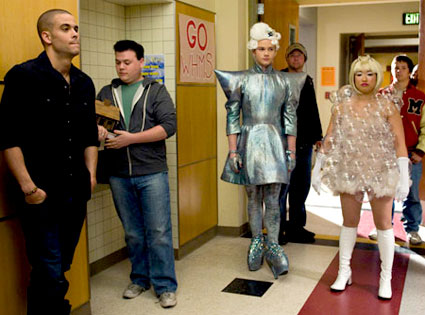Is It OK to Hate Glee?
Made the mistake the other day of mentioning I don't like Glee. My friends say I'm a hater. Why do I have to like Glee?

First of all, you can't dislike anything anymore without being called a hater. Not a fan of Miley's movies? Hater. Have a less-than-five-star critique of Rob Pattinson's acting? Hater. Dare to suggest that the final season of Lost is being written by a pod of peyote-munching sea lions with laptops? Hate! Hate! Hater!
But there is a science behind your psychology. Seriously!
There's a reason why so many people adore Glee—and why those left behind may actually feel guilty if they can't identify with Lea Michele:
And that's because Glee is you and me.
Humor me, here, with the help of Paul Levinson, a film, TV and media professor at Fordham University.
"I see Glee as parallel to Friday Night Lights, in that it takes place in Middle America," Levinson explains.
"Shows like 24, they're not real life. This isn't Lost, with people time-traveling into alternate realities. It's not about some supervillain or superagent who can get all the bad guys. It's about people living their lives—in a much more exciting way than most people, but still, for the most part, in a real way."
Of course, most of us don't burst into song at car washes like the Glee kids. But that's not the point, Levinson explains.
Most of us can identify with a high school experience, or being labeled as an uptight wannabe or jock, or dealing with an overly aggressive teacher, or simply joining an unpopular extracurricular activity. In other words, when it comes to the show's appeal, Glee is America.
And if you hate Glee, or don't get Glee, or can't appreciate Glee, you have a problem with America.
"Yeah," Levinson tells me, "that is actually a very good way of putting it."
Of course, Mr. Levinson. Because if you told me otherwise, you'd be a hater.

First of all, you can't dislike anything anymore without being called a hater. Not a fan of Miley's movies? Hater. Have a less-than-five-star critique of Rob Pattinson's acting? Hater. Dare to suggest that the final season of Lost is being written by a pod of peyote-munching sea lions with laptops? Hate! Hate! Hater!
But there is a science behind your psychology. Seriously!
There's a reason why so many people adore Glee—and why those left behind may actually feel guilty if they can't identify with Lea Michele:
And that's because Glee is you and me.
Humor me, here, with the help of Paul Levinson, a film, TV and media professor at Fordham University.
"I see Glee as parallel to Friday Night Lights, in that it takes place in Middle America," Levinson explains.
"Shows like 24, they're not real life. This isn't Lost, with people time-traveling into alternate realities. It's not about some supervillain or superagent who can get all the bad guys. It's about people living their lives—in a much more exciting way than most people, but still, for the most part, in a real way."
Of course, most of us don't burst into song at car washes like the Glee kids. But that's not the point, Levinson explains.
Most of us can identify with a high school experience, or being labeled as an uptight wannabe or jock, or dealing with an overly aggressive teacher, or simply joining an unpopular extracurricular activity. In other words, when it comes to the show's appeal, Glee is America.
And if you hate Glee, or don't get Glee, or can't appreciate Glee, you have a problem with America.
"Yeah," Levinson tells me, "that is actually a very good way of putting it."
Of course, Mr. Levinson. Because if you told me otherwise, you'd be a hater.




 4/16/2010 11:43:00 AM
4/16/2010 11:43:00 AM
 kenmouse
, Posted in
kenmouse
, Posted in
0 Response to "Is It OK to Hate Glee?"
Post a Comment
Leave Your Thoughts & We Will Discuss Together